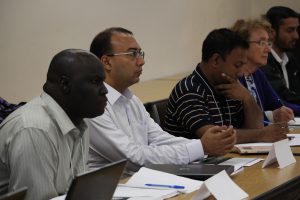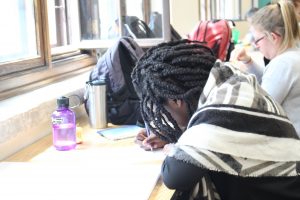Courses
All courses can be taken for training or for undergraduate credit. In addition, courses marked with an asterisk (*) can also be taken for graduate credit and can be used towards CMU's MA in Peace and Collaborative Development (Click here for more information on the MA-PCD).
Participants may apply for more than one course, but must ensure that course schedules do not overlap. At this time, we are planning for mainly in-person courses in 2023 and will have one online courses available in Session I. See course descriptions below for availability.
SESSION I: June 5-9, 2023
The Home as Grounds for Radical Economics*
Instructor: Katie Kish
PCTS/POLS/BUS-3950 and PCD-5790
Syllabus – PCTS/POLS/BUS-3950
Syllabus – PCD-5790
Online course only. Participants who will be in Winnipeg while taking this course are encouraged to come to campus to zoom in and meet other local participants during the coffee breaks and lunch.
This course explores how the historical progression of gender and livelihood within economics, politics, and development are manifested in modern society’s norms, values, and power structures. Additionally, it Includes a survey of the history of Canada’s current political economy alongside a review of modern heterodox economic approaches such as radical homemaking, degrowth, and ecological economics.
Indigenous Cultural Safety: Working authentically across difference*
Instructor: Harley Eagle
SOC/IND/PCTS-3950 and PCD-5190
Syllabus – SOC/IND/PCTS-3950
Syllabus – PCD-5190
Originating in the medical and health services field by Māori Indigenous Health care professionals over 30 years ago, Cultural Safety and an emergent secondary concept, Cultural Humility have since spread to many areas of the globe where Indigenous Peoples still maintain connections to their lands. The concept of Cultural Safety strives to address the disparities that many Indigenous Peoples face across many societal sectors by understanding the context and roots of the issues. This course utilizes processes rooted in Indigenous ways of knowing and being as well as interactive small and whole group dialogue and exercises to create a safe learning setting where participants can increase their awareness of the history and ongoing impacts of colonization. This increased self-awareness and strengthening of intercultural behaviours and skills based on Indigenous perspectives as well as an analysis of patterns of systemic oppression are helpful in addressing systemic oppression and its impacts. Indigenous Cultural Safety is an entry point into understanding the dynamics and intersections of forms of oppression across many marginalized groups.
SESSION II: June 12-16, 2023
A reporting disaster? The nature of credible journalism in a competitive compassion market *
Instructor: Monika Kalcsics
COMM/PCTS/IDS-3950 and PCD-5390
Syllabus – COMM/PCTS/IDS-3950
Syllabus – PCD-5390
Credible disaster reporting will be more essential than ever in the future because pictures of despair and unmediated voices are transmitted instantly, which has consequences for responses and recovery. Aid agencies compete for positive media coverage and donations, and journalists who embed with the UN or NGOs to gain access to compelling stories can compromise their credibility.
This course seeks to examine the practice of a content-hungry disaster news market, and asks tough questions about transparency, ethics, and the impact of news media. It will also explore the questions around NGOs and the competitive compassion market. A series of case studies and broader discussions will be used to see if crisis news can become more constructive and relevant to both the people involved and the audiences who want to know and care about what is happening. Some practical production skills will be taught.
Healing Haunted Histories: Decolonizing from the Inside Out*
Instructors: Elaine Enns and Ched Myers
PCTS/BTS/INDS-3950 and PCD/BTS-5190
 Syllabus – PCTS/BTS/INDS-3950
Syllabus – PCTS/BTS/INDS-3950
Syllabus – PCD/BTS-5190
Through bible studies, social analysis, communal narratives and historical literacy, this course will tackle the oldest and deepest injustices on the North American continent, which inhabit every intersection of settler and Indigenous worlds past and present. We will explore the places, peoples and spirits that have formed (and deformed) us in order to build capacity for our Settler discipleship of decolonization and personal and political Restorative Solidarity with our Indigenous neighbours.
To hear what past participants are saying about the Canadian School of Peacebuilding, take a look at this video:








